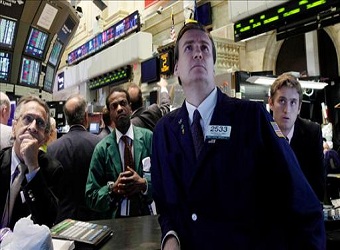U.S. stocks closed higher Monday in low volume trade as traders bought some recently less-favored sectors, while some top postelection plays lagged.
“It’s just an overflow technically into equities and people are just trying to pick up what hasn’t run up as much as the recent leaders,” said Ilya Feygin, managing director and senior strategist at WallachBeth Capital. “The gains are becoming smaller and smaller.”
Telecommunications, the second-best performer in the S&P 500 since the election, gained nearly 1.1 percent to lead advancers, followed by real estate, industrials and tech.
Tech and real estate are among the greatest laggards in the S&P 500 since Election Day. Financials, the top performer since the election, clung to slight gains while energy, the third-worst performer since the election, was among three S&P 500 decliners Monday.
“We’re still seeing a lot of consolidation. I think the path of least resistance is to the upside,” said John Caruso, senior market strategist at RJO Futures. He expects the S&P 500 to rise about 2 percent between Monday and the end of the calendar year.
The Nasdaq 100 hit a fresh all-time intraday high, while the three major indexes closed within 0.75 percent of their record highs. The major averages ended off session highs.
Exchange-traded product platform NYSE Arca temporarily suspended trading at 10:50 a.m., ET, due to a technical issue. Trading resumed shortly after 11 a.m.
In economic news, the flash U.S. Markit PMI services for December was 53.4, down slightly from 54.6 in November.
Fed Chair Janet Yellen said the U.S. has the strongest jobs market in nearly a decade, and there are indications wage growth is picking up. Yellen was speaking at a University of Baltimore commencement ceremony.
The Federal Reserve raised rates for the second time in a decade Wednesday, and surprised by forecasting three rate hikes for 2017, more than the consensus two.
Overseas, the Bank of Japan is set to conclude its two-day meeting on monetary policy Tuesday local time.
“People will probably be looking at the … policy decisions from central banks. Specifically we get Bank of Japan tonight,” said Ryan Larson, head of equity trading, U.S., at RBC Global Asset Management.
“As we probably see volume evaporate through the week ahead of the holiday it won’t take much to push markets around, exacerbation of some moves,” he said.
As of the close, trade volume across U.S. exchanges was just over 6 billion, tracking for the lowest composite volume since Black Friday, the day after Thanksgiving.
The stock market is “going to be sort of sideways and slightly up into the year-end,” said Marc Chaikin, CEO of Chaikin Analytics. “I’m not sure we’re going to break out in a big way.”
Stocks held higher Monday despite a report that several people died and many others were injured by a truck that plowed into a crowded Christmas market in Germany’s capital, Berlin, police said, who could not confirm that the incident was an attack.
Traders also monitored news that the Russian ambassador to Turkey died after being shot by a gunman at an art gallery in the Turkish capital. The Turkish lira fell to session lows against the U.S. dollar following the report, while the Russian rouble also weakened versus the greenback.
The Japanese yen gave up some ground against the U.S. dollar to trade near 117.1 yen, while the euro was near $1.042. The U.S. dollar index climbed above 103 in afternoon trade.
Treasury yields were lower, with the 2-year yield near 1.22 percent and the 10-year yield around 2.54 percent in afternoon trade.
U.S. crude oil futures for January delivery settled up 22 cents, or 0.42 percent, at $52.12 a barrel.
The Dow Jones industrial average closed up 39.65 points, or 0.20 percent, to 19,883.06, with Microsoft and United Technologies the greatest advancers and Merck the greatest laggard.
The S&P 500 closed up 4.46 points, or 0.20 percent, at 2,262.53, with telecoms leading eight sectors higher and health care, energy and materials the only decliners.
The Nasdaq composite closed up 20.28 points, or 0.37 percent, at 5,457.44
The CBOE Volatility Index (VIX), widely considered the best gauge of fear in the market, fell below 12 to hit its lowest since Dec. 9.
About three stocks advanced for every two decliners on the New York Stock Exchange, with an exchange volume of 781 million and a composite volume of nearly 3.4 billion in the close.
Gold futures for February delivery settled up $5.30 at $1,142.70 an ounce.
On tap this week:
Tuesday
No reports expected
Wednesday
10:00 a.m. Existing home sales
Thursday
8:30 a.m. Initial claims
8:30 a.m. Durable goods
8:30 a.m. Real GDP
9:00 a.m. FHFA HPI
10:00 a.m. Personal income
Friday
10:00 a.m. New home sales
10:00 a.m. Consumer sentiment
Source: CNBC



